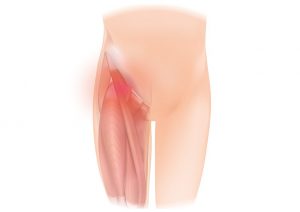Pregnancy is a time of many expectations and dreams for women, but it is also a time full of questions and, in many cases, pain. But how do you know if a pain is normal or not? Well, doing some research can help you solve your problem. And exactly because this type of question frequently arises, today we’re going to talk about groin pain during pregnancy. Is it really normal? Why does this type of pain happen? How is it treated? We will talk about these and other questions. Check it out!
Is It Normal to Have Groin Pain During Pregnancy?
Many women experience pregnancy as a time when pains are common too. On the one hand, this reassures many since these pains are normal, but on the other, it causes concern, since no one likes to feel pain or wants their baby to be affected by their health condition. Groin pain is one of the most common types of pain in pregnancy and can occur for several reasons1 (which we’ll mention later in the text). Of course, like any change in your body, you should pay attention, but not excessively. The main thing to do when you feel groin pain during pregnancy is to see a doctor to understand how treatment should be done.
Possible Causes of Groin Pain During Pregnancy
As mentioned earlier, groin pain during pregnancy can happen for several reasons. However, the main ones are:
- Urinary Tract Infection
- Arthrosis
- Swollen Lymph Nodes
- Intestinal Inflammation
- Kidney Stones
- Appendicitis
Let’s talk a little more about each of these causes and explain how they can affect a pregnant woman.
Urinary Tract Infection
It’s not uncommon to see women with urinary tract infections during pregnancy2. This usually happens due to the growing belly, which makes the bladder more compressed and squeezed. In addition, the amount of germs present in the kidneys can increase due to the greater blood circulation in the area, which pregnancy causes. One of the symptoms of a urinary tract infection in pregnancy is specifically groin pain. Treatment for a urinary tract infection usually involves antibiotics, but many of them cannot be taken during pregnancy, which can be an issue. The most recommended thing in these cases is to see a doctor who can advise on the most appropriate type of treatment in your case. If the disease is not treated seriously, some complications can occur, such as a widespread infection, which can, among other things, lead to premature labor. That’s why it’s important to see a doctor to be treated.
ATTENTION: A woman’s body often becomes more vulnerable because of pregnancy, and taking medication on your own can result in negative side effects for both the woman and the baby. So never self-medicate when you have any type of groin pain during pregnancy.
Arthrosis
As we mentioned earlier, pregnancy is a stage in a woman’s life involving many changes, both hormonally and anatomically. For this reason, women who already have some type of rheumatic disease, such as arthrosis, end up being even more affected. That’s because it’s natural for weight to increase and for women to have more fluid retention. Depending on the severity of the arthrosis, groin pain can be quite bothersome and may require a visit to the doctor for appropriate treatment.
Swollen Lymph Nodes
Groin pain in pregnancy can also be a sign of swollen lymph nodes, which is not only uncomfortable but can affect a woman’s daily life and consequently the pregnancy as a whole. The causes of swollen lymph nodes are varied and can range from skin infections to sexually transmitted diseases. For that reason, it’s very difficult to give a definitive diagnosis about how this problem should be treated, as it depends directly on the cause. It’s very important for the doctor you see to know you’re pregnant because not all treatments are suitable in these cases. Again, self-medication is extremely dangerous and can seriously affect your pregnancy, so never do it. 
Intestinal Inflammation
Inflammations of the intestines are not exactly common, but they can become a serious problem if the woman has a genetic predisposition or a history of such diseases. In addition to groin pain, women usually experience a burning sensation in the intestinal area, as well as diarrhea, bloody stools, and even fever. The disease itself does not directly affect pregnancy, but since it can make the woman weaker, it needs to be controlled as well as possible. A specialist doctor will evaluate and prescribe the necessary treatment so your baby will not be affected and so you can get rid of intestinal inflammation calmly.
Kidney Stones
As you can see, groin pain during pregnancy is not always directly related to the fact a woman is pregnant. However, this does not mean that problems like kidney stones do not affect pregnancy. Because even if they are not directly related to pregnancy, they can have indirect effects on the fetus’ development, as the woman’s health will be more fragile and therefore more susceptible to other problems, in addition to passing fewer vitamins and minerals to the baby. Treatment for kidney stones during pregnancy depends on several factors, including the stage of pregnancy and the severity of the condition. The most recommended approach is to prevent this type of problem before getting pregnant, by always drinking plenty of water. This can help avoid a lot of worries and headaches at a time when you have to think about many other things.
Appendicitis
Groin pain in pregnancy can also mean appendicitis3. This symptom is usually accompanied by others, such as intense pain on the right side of the abdomen, loss of appetite, nausea, and vomiting. Treatment of this problem is surgical and requires a precise diagnosis from the doctor to know what type of surgery should be done to avoid any side effects for the baby and the pregnancy in general. After surgery, the woman should have weekly follow-ups to check for any aftereffects or infections and ensure her pregnancy is not affected by this issue. Although it happens, it’s not exactly common during pregnancy. There are many cases of women who have symptoms of appendicitis when pregnant, but in reality, they’re just reflections of pregnancy itself. Therefore, a consultation with an obstetrician is extremely important to get an accurate diagnosis.
Treatment for Groin Pain During Pregnancy
As you could see, each type of problem requires a different type of treatment. Some of them can affect pregnancy more, while others may be entirely harmless. It’s also worth noting that this kind of pain is fairly common from the beginning and may just indicate changes in the woman’s body, not necessarily a disease. Groin pain at the end of pregnancy, from when the woman is at 34/35/36/37/38 weeks, becomes more common. Groin pain after a vaginal delivery also often happens with many women. In these cases, the pains usually fade naturally, and there’s no need to worry. Having groin pain in pregnancy is not exactly uncommon or even concerning. However, the causes of this pain should be investigated and, above all, treated correctly. That’s how you ensure a smooth pregnancy and avoid making this a traumatic time for you. Of course, it will always be a unique experience, marked by doubts and concerns but also hope, happiness, and anticipation in the best sense of the word. And it is these positive aspects that should prevail in any pregnancy.











